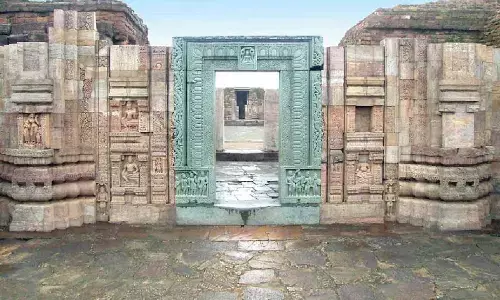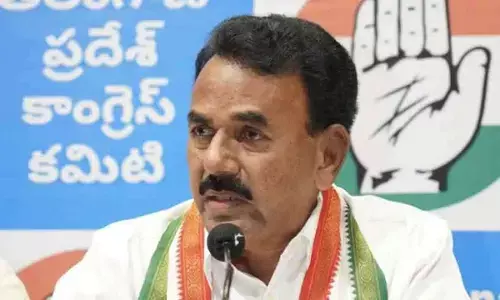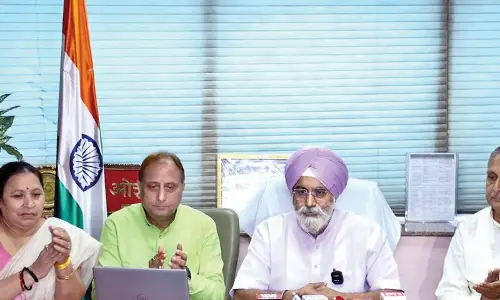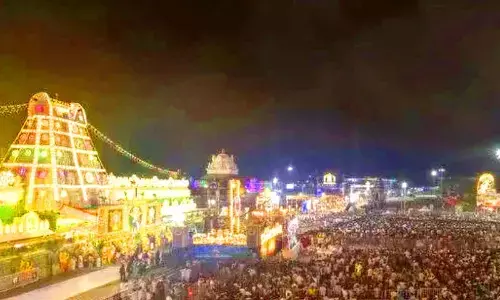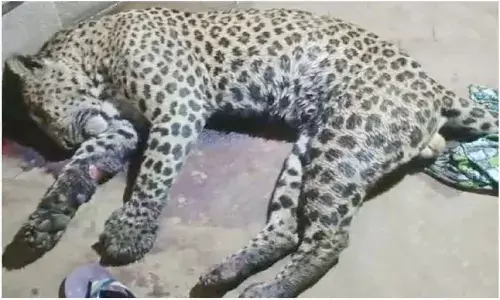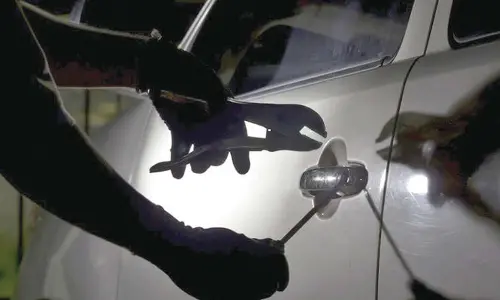Death of Babri Case: A post-mortem
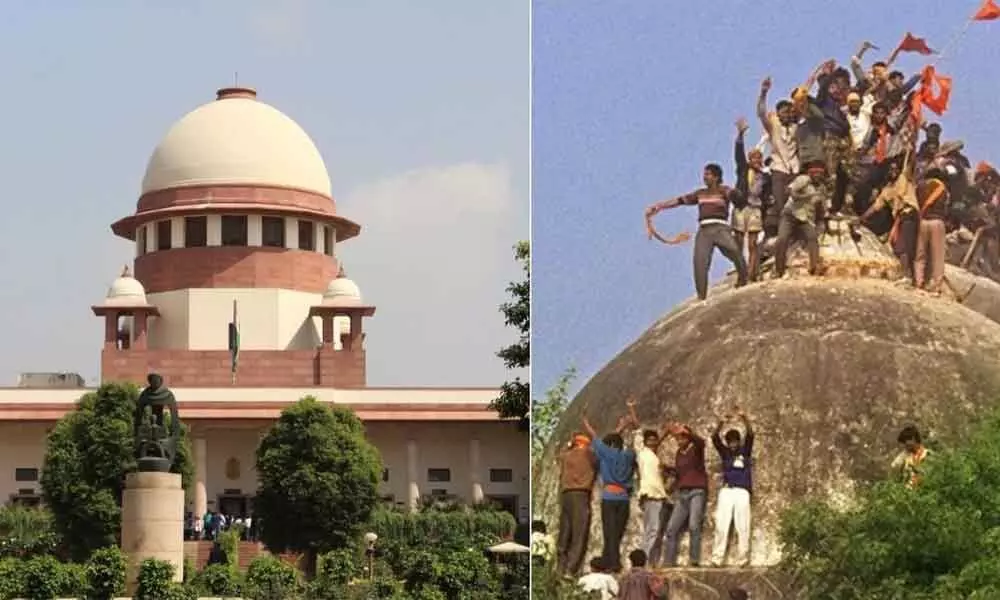
Death of Babri Case: A post-mortem
It is an open secret that Sangh Parivar has destroyed the Babri structure in Ayodhya under the supervision of L K Advani and Kalyan Singh, the then Chief Minister
It is an open secret that Sangh Parivar has destroyed the Babri structure in Ayodhya under the supervision of L K Advani and Kalyan Singh, the then Chief Minister. It was their declared political agenda. Rath Yatras, kar sevak mobilisation with tools of destruction and collection of bricks for temple were known to all. One can understand investigating agencies failing in establishing 'conspiracy' to destroy the masjid among high-profile leaders of BJP and Karsevaks is almost impossible. But failing to establish that at least a few accused physically demolishing the structure is a shame.
It is obvious that more than failing it is CBI's unwillingness to prove the provocative speeches of the leaders. Around the 151st birth anniversary of Mahatma Gandhi, the largest state of UP has shown that the rulers or not willing to investigate crimes against downtrodden to save the highly powerful sections and not interested in proving the political crimes like demolition of Babri structure. It is not failure of justice system, but deliberate destruction of investigating mechanism.
The Special CBI Court referring to the Central Bureau of Investigation said: "The charge sheet has no evidence on the basis of which it can be established that the named accused had incited any riot or were part of it."
Following paragraphs of the Judgment has exposed the working of CBI in such an important international controversy which disturbed the communal harmony and constitutional governance in India.
No voice samples presented
"As far as the prosecution witnesses describing slogans raised by the accused and have pointed to some accused saying they raised the slogan - ek dhakka aur do Babri Masjid tod do (give one more push to demolish Babri Masjid) - the charge-sheet makes it clear there were lakhs of Kar Sewaks in the complex and they were raising slogans, on the question of the named accused raising these slogans, in this respect no record or matching voice samples have been presented."
No correlation with voice samples and accused
"On the question of the accused raising slogans, the recordings of slogans raised by a specific accused were not correlated with voice samples of that specific accused and presented in court, which is a strong evidence about which accused raised which specific slogan that led to religious sentiments being hurt."
The anti-social kar sewaks!
"That the named accused got together in common cause with anti-social kar Sewaks to bring down the disputed structure, there is no evidence in the chargesheet to prove this. The leaders seated on stage and those near the Ram chabutara - Ashok Singhal, Vijaya Raje Scindia - did not suspect that a section of the Kar Sewaks will get agitated and climb the disputed structure."
Witness alleges CBI tampered electronic records
"Which accused person gave what speech on December 6, 1992, the prosecution has not managed to prove this with evidence. The video cassettes that have been presented, their related witnesses have themselves accepted these are edited and tampered." Will CBI answer this allegation?
No identification of provocative speech
"To prove an offence under Section 153 A and 153 A of IPC (Indian Penal Code), the prosecution has to prove that which accused gave what specific speech that led to enmity between two groups and led to a breakdown in communal harmony. If the accused have merely given an inciting speech only on that basis the person cannot be pronounced guilty."
Several other mistakes
The investigating agency was found wanting since beginning. It committed several procedural, legal and technical mistakes of substantial nature that led to procrastination of litigation and also invited intervention of Supreme Court with special powers to investigate the top leaders also.
Amending FIRs and adding names
A special court was set up in 1993, at Lalitpur in UP for conducting trial of these cases, in consultation with Allahabad High Court. Before the transfer, the Special Magistrate had added charges of conspiracy to the kar sewaks FIR. The Uttar Pradesh government notified the trial against the kar sewaks. This does not deal with the allegations against high profile politicians who alleged to have provoked the destruction. Then U P government issued a notification after amending the earlier to include the FIR against political leaders, which was not mentioned in previous notification. This was struck down for lack of consultation with the High Court under Section 11(1) of the Criminal Procedure Code.
Later, after completing the investigation the CBI has filed a consolidated charge sheet against 48 accused including Bala Saheb Thackeray, Kalyan Singh, Moreshwar Save, Champat Rai Bansal, Mahant Avaidyanath, Dharam Das, Mahant Nritya Gopal Das, Param Hans Ram Chandra Das, and others on October 5, 1993.
The charge that could not stand in High Court
BJP's L.K. Advani, Ashok Singhal, Vinay Katiar, Uma Bharati, Sadhvi Ritambara, Murli Manohar Joshi, Giriraj Kishore, and Vishnu Hari Dalmia were named in supplementary Charge Sheet filed by CBI in 1996.
The Special Judge at Lucknow perused the charge sheets, expressed satisfaction that a prima facie case was made out against the eight leaders, and accorded permission to prosecute, on September 09, 1997. This order of Special Judge was challenged before the Allahabad High Court and, on February 12, 2001, the High Court set aside the order.
There was a technical issue that led to nullification of notification transferring FIR No. 198 to Lucknow. It was a curable defect if the State Government permits the CBI. The CBI made a request. But the then UP Government has turned down the request. Meanwhile, the CBI chose to file a supplementary charge sheet before the Judicial Magistrate in Raebareli for prosecution of the BJP and other political leaders.
There was another development in 2001. The Special Court dropped the charges against 21 accused including all leaders of various political parties, 8 accused and 13 others who were included in supplementary charge sheet. This judgment of Special Court was questioned as illegal before the Allahabad High Court.
The High Court has upheld the special judge's order dropping the charges based on the difference between FIR against kar sewaks and political leaders. The High Court also found that the additional charge of conspiracy against the leaders levelled in supplementary charge-sheet as not acceptable because the same was absent in its earlier notification. The CBI's supplementary charge-sheet filed at Raebareli had no charge of criminal conspiracy, which means that charge was never made out against the 8 leaders.
Supreme Court restores the charges
Thus, the High Court approved the discharge of the top leaders from allegations of conspiracy to destroy the structure in Ayodhya. At the preliminary stage itself the CBI was under a compulsion to take the issue to apex court. The CBI approached the Supreme Court in 2011 against the discharge of the political leaders. This appeal consumed six years and in 2017, a bench of Justices Pinaki Chandra Ghose and Rohinton Fali Nariman heard the arguments for three days, March 22-23, and on April 06, 2017.
Justice Rohinton Nariman took the case beyond the procedural deficiencies that created hurdles and technical infirmities so far on prosecution of accused of high-profile nature. The Supreme Court bench has invoked its special powers under Article 142 of our Constitution, to do complete justice, and ordered the consolidation of all trials arising from all the FIRs before the Special Court at Lucknow.
The Supreme Court has rightly agreed with the judgment of the Allahabad High Court that both the offences, - the demolition by the kar sewaks and instigation by the leaders formed a part of the same transaction. But the SC did not agree with the conclusion of the Allahabad High Court's 2011 judgment.
The apex court held that HC was wrong and transferred the trial from Raebareli to the Special Judge in Lucknow. The Supreme Court directed the Special Judge at Lucknow to add the charge of criminal conspiracy against L.K. Advani, Vinay Katiyar, Uma Bharti, Sadhvi Ritambara, Murli Manohar Joshi and Vishnu Hari Dalmia, which was dropped by HC. As decades passed, the SC directed Lucknow court to hear all matters on day-to-day basis.
In addition, the Supreme Court's judgment barred the transfer of the judge conducting the trial, de novo trial, and grant of adjournments for want of witnesses, unless necessary, and for reasons to be recorded in writing. It is again because of the deadline fixed by the SC the trial of these cases ended today. First it was August 19, later it was extended to September 30.
While demolition of Babri structure destroyed rule of law, the CBI's failure in establishing guilt is fatal blow to criminal justice system.
(The writer is Dean, School of Law, Bennett University, and former Central Information Commissioner)








